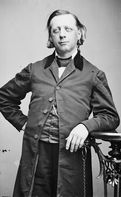|
This post continues a series discussing some of the United States's pressing political issues leading up to the Civil War, when the impact of Harriet Beecher Stowe's writing was also being felt across the country. This installment discusses the abolitionist work of Henry Ward Beecher, Harriet's younger brother who had studied at Lane Seminary in Cincinnati and pastored in Indianapolis before moving to New York. CLICK HERE to read previous installments. The Kansas–Nebraska Act of 1854 called for popular sovereignty, whether the Kansas Territory would allow or prohibit slavery, and thus enter the Union as a slave state or a free state would be left up to the people living there. Both pro- and anti-slavery supporters tried to lure settlers to Kansas in order to sway their decision one way or the other. Missouri entered the Union as a slave state in 1821 and many of its citizens held pro-slavery views. Some of them crossed into Kansas claiming to be residents in an attempt to influence the decision. The seven year conflict was characterized by electoral fraud, raids, and murders carried out in Kansas and neighboring Missouri by pro-slavery "Border Ruffians" and anti-slavery "Free-Staters." The antagonism between sides verged on civil war, and the period became known as "Bleeding Kansas.”  Henry Ward Beecher Henry Ward Beecher Henry Ward Beecher was preacher and passionate abolitionist. His Plymouth Church in Brooklyn, NY, along with the New England Immigrant Aid Society, founded in Boston, raised money to send rifles to help the anti-slavery settlers protect themselves from the Border Ruffians. These became known as Beecher’s Bibles after Henry Ward stated that trying to teach slave owners the errors of their ways was like reading “the Bible to Buffaloes.” On March 30, 1855, the Kansas Territory elected its first territorial legislature who would decide whether the territory would allow slavery. Border Ruffians from Missouri again streamed into the territory to vote, and pro-slavery delegates were elected to 37 of the 39 seats. Questions about electoral fraud resulted in a subsequent special election in May but the pro-slavery camp again prevailed with an 29–10 advantage. Congress sent a three-man special committee to the Kansas Territory in 1856 in response to the disputed votes and rising tension, The committee report concluded that had the March election been limited to "actual settlers" it would have elected a “free-state” legislature. The report also stated that the legislature actually seated "was an illegally constituted body, and had no power to pass valid laws”. Nevertheless, the pro-slavery legislature residing in Shawnee Mission, Kansas, began passing laws favorable to slaveholders. In August, anti-slavery residents met to formally reject the pro-slavery laws passed by what they called the "Bogus Legislature". They quickly elected their own Free-State delegates to a separate legislature based in Topeka and drafted the first territorial constitution, the Topeka Constitution. The federal government under the administration of President Franklin Pierce refused to recognize the Free-State legislature. In a message to Congress on January 24, 1856, Pierce declared the Topeka government insurrectionist in its stand against pro-slavery territorial officials. These “rival” constitutions were the first of several written by pro and anti slavery legislators who considered the opponent’s constitutions illegitimate. Violent conflict across eastern Kansas lasted for several years most notably the sacking of Lawrence Kansas and the presence of a strident abolitionist named John Brown. The hostilities continued until a new territorial governor, John W. Geary, took office and managed to prevail upon both sides for peace. Ultimately, Kansas was admitted to the Union as a free state in January, 1861, following the departure of Southern legislators from Congress during the secession crisis. Throughout the Civil War Union control of Kansas was never seriously threatened. Sources: The War Before the War by Andrew Delbanco (2018) Penguin Press https://www.kshs.org/kansapedia/kansas-territory/14701 About the author:
Dr. Nicholas Andreadis is a volunteer at the Harriet Beecher Stowe House. He was a professor and dean at Western Michigan University prior to moving to Cincinnati.
1 Comment
6/18/2022 02:26:07 am
The report also stated that the legislature actually seated was an illegally constituted body, and had no power to pass valid laws. Thank you for taking the time to write a great post!
Reply
Leave a Reply. |
Archives
March 2025
Categories
All
|
|

 RSS Feed
RSS Feed